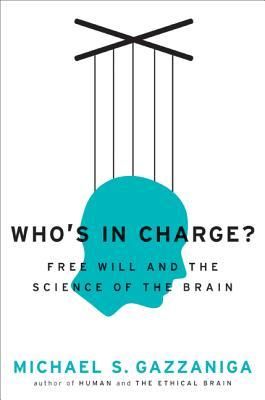Neuroscientist and Gifford Lecturer Michael S. Gazzaniga explores the implications of the latest research in brain research, namely, that we live in a “determined” world, that our brains are governed by the laws of the physical world and not our conscious selves. If our conscious selves are not in control, we may not be responsible for our own actions.
Despite the title, this book isn’t really about free will. But it is a fantastic explanation of how our brains fill in gaps and make guesses, back-filling memories and sensations to create a seamless world in which we live. Studies from patients with “split-brains” clearly demonstrate how our conscious awareness, and justification and explanation of our own actions take place well after we have already acted.
Gazzaniga discusses the ramifications of modern neuroscience, including some psychology, ethics, and law, in addition to proposing his own theory of how and why he thinks our conscious minds are accountable. Gazzaniga’s postulation is that the conscious mind “constrains” the brain, just as cars are constrained by traffic. Our brains are comprised of distinct and separate physical processes of neurons firing, but the brain as a whole, and especially multiple brains together create an emergent property of mind. A murderer cannot argue that he is not responsible for his actions because he lives within a society in which human interactions create the idea of responsibility.
There is also a significant comparison to physics, specifically quantum mechanics, because the laws of determinism that work so well in classical mechanics fall apart on such a small scale. Although I follow his comparison, I do not think his interpretation of the laws of physics, which are mathematical models of the behavior of objects of different sizes and at lower temperatures, is correct, nor that they support his theory.
Setting aside the physics talk, Gazzaniga’s postulation that we are responsible for our own actions because we know right from wrong, lawful and unlawful in practice, is a discussion more appropriate to social science, not neuroscience. There is absolutely no science to back up a theory of collective consciousness or that from multiple brains emerges a higher mindset of social responsibility. His argument is philosophy and speculation.
Personally, I do not find determinism such a scary notion, but I must be in the minority, as more than half of this book is dedicated to convincing ourselves that we have some sort of free will. Even though I do not agree with the author, I find the subject matter compelling, and his arguments engaging.
Highly recommended for fans of the neurological sciences!
“The brain has millions of local processors making important decisions. It is a highly specialized system with critical networks distributed throughout the 1,300 grams of tissue. There is no one boss in the brain. You are certainly not the boss of the brain. Have you ever succeeded in telling your brain to shut up already and go to sleep?”
